Trump could order SEAL Team 6 to kill rivals and avoid prosecution if not impeached, lawyer says
WASHINGTON – Donald Trump as president could have ordered the military to kill his political rivals, sold military secrets to foreign adversaries or peddled pardons to criminals and still would be immune from prosecution for those crimes today unless he were first impeached and then convicted in a Senate trial, his lawyer told a federal appeals court Tuesday.
“You’re saying a president could sell pardons, could sell military secrets, could order SEAL Team 6 to assassinate a political rival,” Judge Florence Pan told Trump lawyer John Sauer during arguments at the D.C. Circuit Court of Appeals over whether he is immune prosecution.
Sauer told the three-judge panel a president would be swiftly impeached and convicted for ordering the murder of a rival. But he argued that without an impeachment, the Supreme Court has held that a president’s official acts are never reviewable by the courts.
“He would have to be and would speedily be impeached and convicted before the criminal prosecution,” Sauer said. “There is a political process that would have to occur under our Constitution.”
“If there’s no impeachment ever, and no conviction, then the official acts are immune. Period,” Sauer added later.
Trump, who attended the hearing, contends he is immune to federal charges of conspiring to interfere in the 2020 election because his actions took place while he was president. He was impeached in the House of Representatives and acquitted in the Senate for similar allegations that he incited the Capitol attack on Jan. 6, 2021.
A prosecutor, assistant special counsel James Pearce, voiced concern for the country’s future if presidents could kill rivals or sell national secrets and suffer no consequences without an impeachment and conviction.
“I think that is an extraordinarily frightening future,” Pearce said. “I think if we are talking about balancing interests that should weigh extraordinarily heavily in the court’s consideration.”
The case marks the first chance for federal courts to gauge a former president's criminal immunity because Trump is the first to be charged. Each side claims the Constitution and historical precedent are on their side.
The case could eventually reach the Supreme Court, where Justice Department special counsel Jack Smith last month asked for a ruling. But the high court said the appeals court should weigh in first.
In the meantime, the appeal puts a hold on Trump’s election interference trial tentatively scheduled for March 4. Trump has sought to push this and three other criminal trials he faces until after the November election, as he campaigns again for the White House.
Here is what we know about the case:
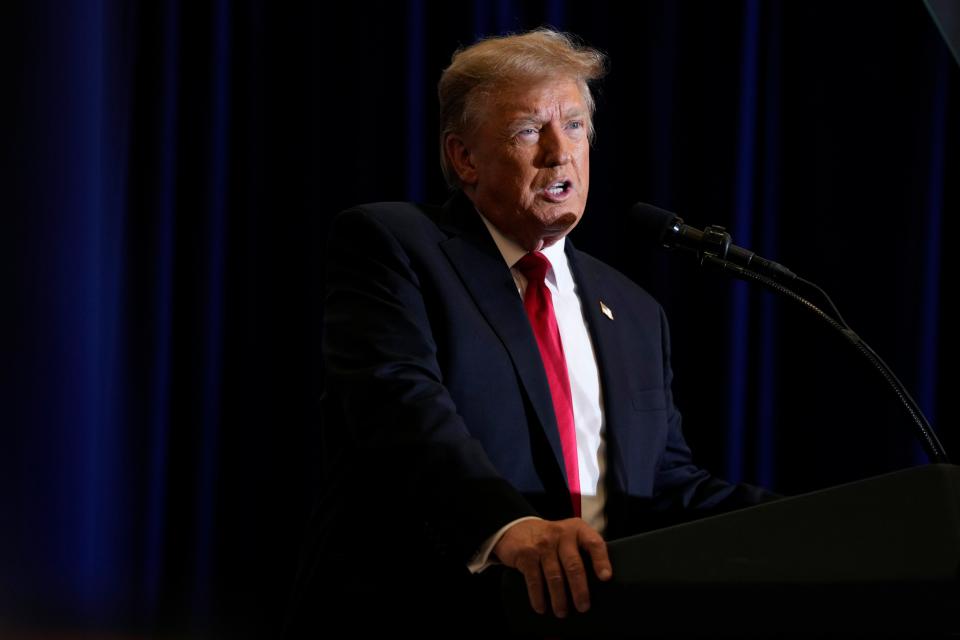
Prosecuting Trump could open 'Pandora's box': Trump lawyer
Requiring the House to impeach and the Senate to convict a president before criminal charges can be pressed appeared to concern the judges hearing the case. The judges said there could be many reasons why Congress might not impeach a president.
“Not everybody has to go through that process,” Judge Michelle Childs said.
“It seems to me that there are a lot of things that might not go through that process because it’s quite a cumbersome process,” Pan said.
But Sauer said the impeachment process is what shields presidents from having political rivals and prosecutors second-guess their policy decisions. He argued the case against Trump should be dismissed.
“The current incumbent of the presidency is prosecuting his No. 1 political opponent and his greatest electoral threat,” Sauer said, referring to President Joe Biden.
Sauer argued that without such protection, George W. Bush could have been prosecuted from spreading false information to justify the invasion of Iraq or Barack Obama for authorizing drone strikes that killed civilians.
“To authorize the prosecution of a president for his official acts would open a Pandora’s box from which this nation may never recover,” Sauer said.
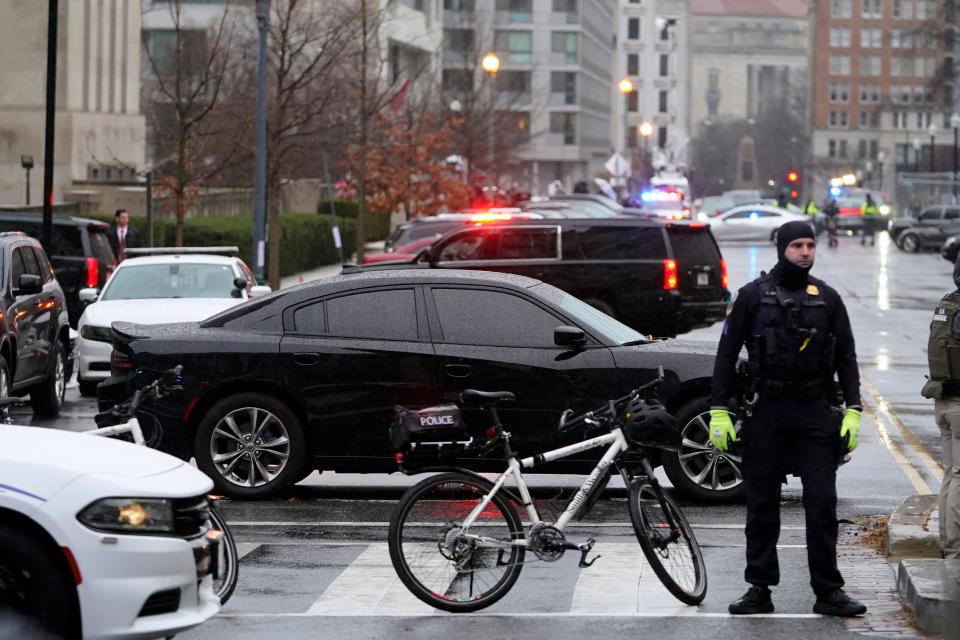
Distinguishing between public, private acts
Judge Childs noted that former President Richard Nixon was pardoned without being impeached, signaling that he could have been prosecuted.
But Sauder argued Nixon's alleged wrongdoing involved private conduct rather than official acts, just as Bill Clinton was accused of private rather than public wrongdoing.
Judge Karen Henderson asked prosecutors how the judges could fashion a decision to avoid opening the floodgates to charges against future presidents.
Pearce argued that prosecutors, grand juries and trial juries already prevent unwarranted charges, as illustrated by Trump being the first former president to face criminal charges.
Investigators in the Iran-Contra scandal assumed Ronald Reagan was subject to prosecution but couldn't find enough evidence to pursue a case, Pearce said.
Pearce disputed that Nixon was accused of private acts because he accused of wielding the CIA to interfere with an FBI investigation. Pearce argued that shielding presidents from criminal liability would provide no accountability.
“I want to push back on this idea of floodgates," Pearce said.
Trump called hearing 'a very good day'
The hearing wasn't the first time Trump has chosen to attend one of his post-presidency court proceedings. He has also showed up several times for his New York civil fraud trial, in which state Attorney General Letitia James is seeking hundreds of millions of dollars from him and his business. Closing arguments in that case are scheduled Thursday.
Trump said he thought the appeals hearing went well. He argued that presidents must be shielded from prosecution and that he did nothing wrong.
"We think we had a very good day today,” Trump told reporters at the Waldorf Astoria hotel in D.C. after the hearing. "A president has to have immunity – and the other thing is I did nothing wrong, we did nothing wrong."
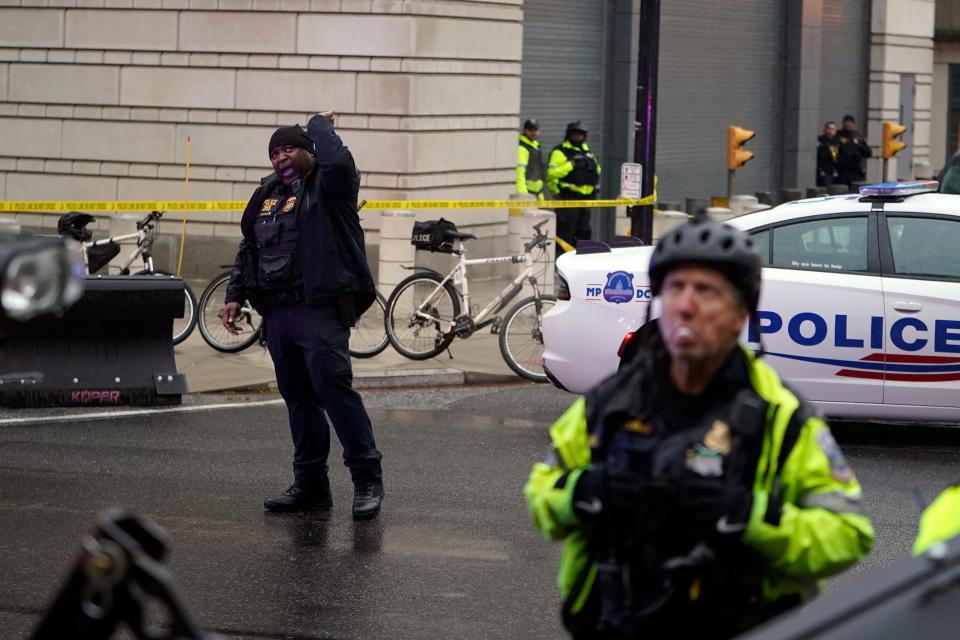
What are the charges Trump is seeking immunity from?
Trump has pleaded not guilty to four federal charges ? three for conspiracy and one for obstruction ? for falsely claiming election fraud and trying to overturn the legitimate election results.
Prosecutors contend the conspiracies culminated with the Capitol attack on Jan. 6, 2021. The riot temporarily prevented Congress from certifying Biden's victory, forced lawmakers and then-Vice President Mike Pence to flee and injured more than 140 police officers.
U.S. District Judge Tanya Chutkan rejected Trump's request to have the case dismissed. "Defendant’s four-year service as Commander in Chief did not bestow on him the divine right of kings to evade the criminal accountability that governs his fellow citizens," Chutkan said in her Dec. 1 ruling.
Trump argued his actions responding to potential election fraud "unquestionably" fell within his official duties. He appealed her decision.
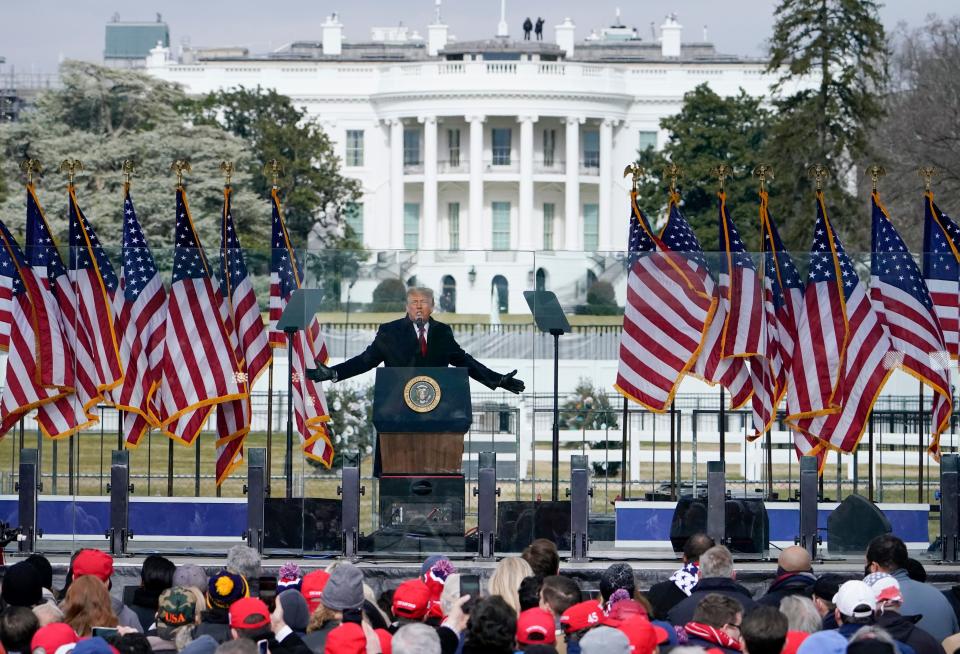
Who is hearing the case?
The case was heard by a three-judge panel. Henderson was appointed by George H.W. Bush. Childs and Pan were each appointed by Biden.
However the panel decides, the losing side could appeal the ruling to the full D.C. Circuit, which has 11 current judges.
Depending on the full appeals court’s ruling, the losing side could ask the Supreme Court to hear the case.
What is Trump's argument?
Trump's lawyers argued that the Constitution and founders of the government thought the president should be shielded from criminal prosecution to protect the office from political antagonists.
"No prosecutor, judge, or jury may sit in judgment over the President’s official acts," Sauer wrote in his filing. "A President’s official acts 'can never be examinable by the courts,'" he wrote, quoting one of the earliest Supreme Court decisions.
Sauer also cited more recent Supreme Court decision called Nixon v. Fitzgerald in 1982. The court ruled 5-4 that presidents have absolute immunity from civil lawsuits for acts in office.
“The President’s ‘unique position in the constitutional scheme’” guarantees him immunity, Sauer wrote.
The Senate’s acquittal of Trump at an impeachment trial charging him with citing the insurrection at the Capitol prevented him from being tried again for the same events, Sauer argued. The Senate voted 57-43 to convict Trump, but a two-thirds majority was required for conviction.
"The likelihood of mushrooming politically motivated prosecutions, and future cycles of recrimination, are far more menacing and crippling to the Presidency than the threat of civil liability,” Sauer wrote.
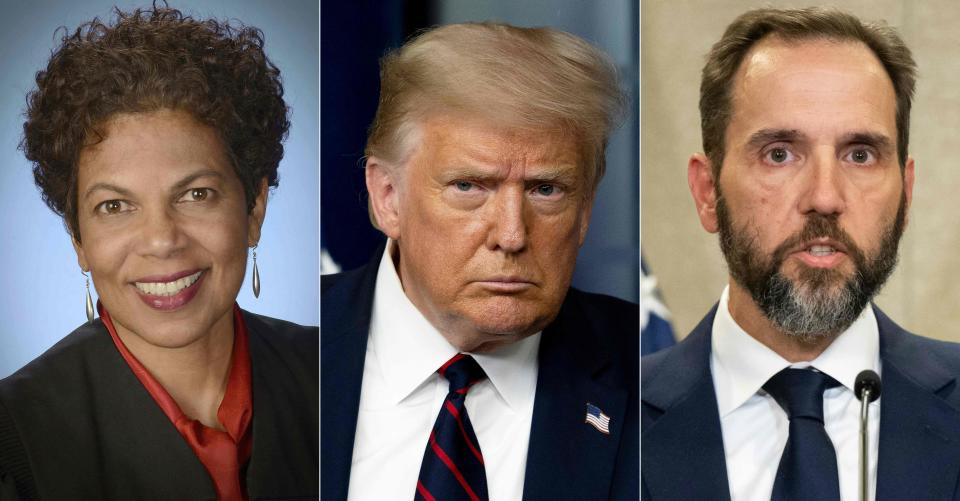
Federal courts haven't ruled on charging a former president
Federal courts haven’t ruled specifically on charging a former president because it’s never come up before.
Despite Sauer’s argument, the Fitzgerald case dealt with civil litigation rather than criminal charges, so its implications for Trump are disputed.
“The immunity is limited to civil damages claims," the late Chief Justice Warren Burger wrote in a concurring opinion in the Fitzgerald case.
Although no previous presidents were charged criminally, Gerald Ford gave a deposition in a criminal trial, Bill Clinton gave videotaped testimony in two criminal cases, Ulysses Grant gave a deposition in a criminal case and Jimmy Carter gave videotaped testimony for use at a criminal trial.
“It is settled law that the separation of powers doctrine does not bar every exercise of jurisdiction over the President of the United States,” the court said in the Fitzgerald case.
The Justice Department issued a memo in September 1973, amid the Watergate investigation, and reinforced it in October 2000 that indicting a sitting president would impermissibly undermine the chief executive. But the department found no prohibition against charges in the Constitution.
“The spectacle of an indicted President still trying to serve as Chief Executive boggles the imagination,” the memo said.
But the memos didn’t deal with a former president and the Justice Department has now charged Trump in two pending cases.
The Supreme Court ruled in a 1974 case, U.S. v. Nixon, that presidents aren't entirely immune from criminal prosecution.
“Neither the doctrine of separation of powers nor the generalized need for confidentiality of high-level communications, without more, can sustain an absolute, unqualified Presidential privilege of immunity from judicial process under all circumstances,” the high court said.
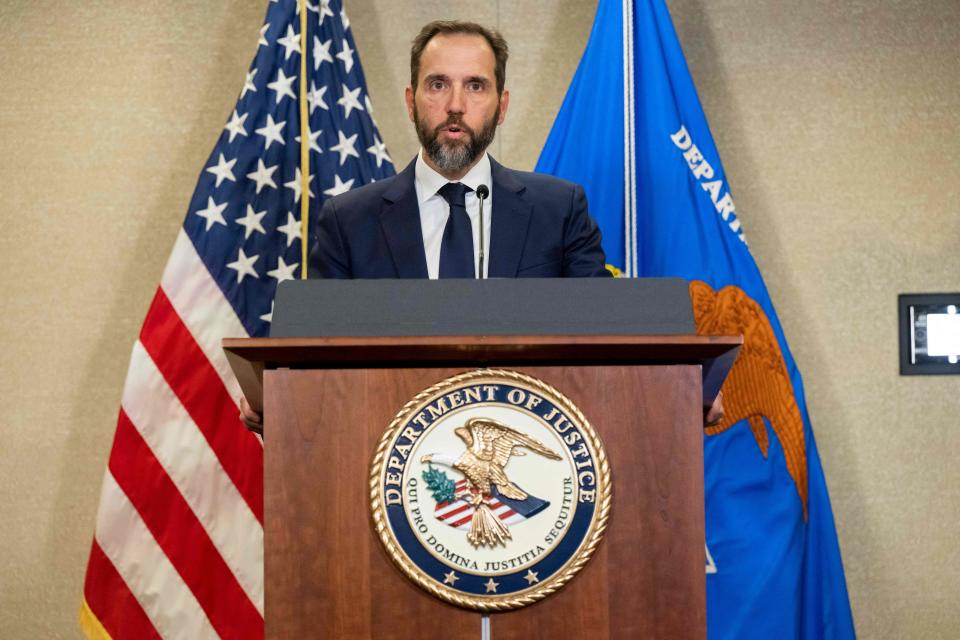
What are prosecutors arguing?
Smith's team argued that historical precedent, the principles of the separation of powers between branches of government and the Constitution all make clear that a former president can be charged criminally.
Smith’s team argued that Trump’s claim of immunity would prevent prosecution of a president who accepts a bribe in exchange for directing a lucrative government contract, a president who instructs the FBI to plant evidence on a political enemy, a president who orders the National Guard to murder his critics or a president who sells nuclear secrets to an adversary.
“Under the defendant’s framework, the Nation would have no recourse to deter a President from inciting his supporters during a State of the Union address to kill opposing lawmakers – thereby hamstringing any impeachment proceeding – to ensure that he remains in office unlawfully,” assistant special counsel James Pearce wrote.
Outside groups raise more questions for judges to consider
The judges notified the Trump and Smith legal team to prepare for questions that outside groups submitted in the case.
One group is a collection of former federal officials who served in Republican administrations. The officials include former Deputy Attorney General Donald Ayer; former U.S. ambassador John Danforth, who was also a senator from Missouri; former Solicitor General Charles Fried; former acting Attorney General Peter Keisler; and Michael Luttig, a former counselor to the attorney general and retired appeals court judge.
The Republicans urged the appeals court to reject Trump's claim, arguing that presidential immunity shouldn’t embolden presidents who lose reelection to engage in criminal conduct. The former officials noted Trump is accused of enlisting Justice Department personnel to make false statements to state officials to overturn election results.
“If that conduct qualified for absolute immunity, this would improperly unleash a future President to disregard current criminal statutes and deploy the military in efforts to alter the results of a presidential election,” lawyer Richard Bernstein wrote for the former Republican officials.
Another group participating in the case is the advocacy group American Oversight, which argued the appeals court has no jurisdiction to hear the immunity case.
American Oversight argued that the Supreme Court has identified only two reasons to allow an appeal to delay a trial: disputes about double jeopardy or the Constitution’s speech or debate clause. Appeals courts have long dismissed similar appeals asserting claims of immunity, the group argued.
“This Court should dismiss this appeal for lack of jurisdiction,” lawyer Stanton Jones wrote for American Oversight.
Trump's lawyer contends the group is wrong by arguing that issues of executive privilege are immediately appealable.
"This is incorrect," Sauer wrote of American Oversight's argument.
This article originally appeared on USA TODAY: As Trump criminal charges go to trial, court faces 'unique position'
